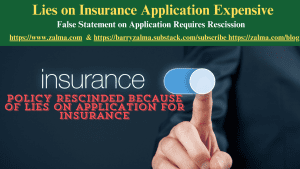Lies on Insurance Application Expensive

Post 4792
See the full video at https://rumble.com/v4so850-lies-on-insurance-application-expensive.html and at https://youtu.be/gkVUNGWdGig
Plaintiff Kimberli Orr obtained no-fault automobile insurance from defendant USA Underwriters and was involved in an automobile collision. Defendant denied plaintiff’s claim for benefits because it discovered that plaintiff made material misrepresentations on her application for insurance. Defendant argued that it was entitled to rescind and void plaintiff’s insurance policy, and the trial court granted defendant summary disposition
In Kimberli Orr v. USA Underwriters, No. 363452, Court of Appeals of Michigan (April 25, 2024) the Court of Appeals resolved the dispute.
THE APPLICATION
In plaintiff’s application for no-fault insurance from defendant, plaintiff Misrepresented that all drivers who might operate her vehicle, including residents of her household, were listed on the application, and that her driver’s license had been suspended or revoked anytime in the three-year period before she applied for the insurance. Defendant issued the policy and, unfortunately, on the next day, plaintiff was involved in an automobile collision.
THE INVESTIGATION
Plaintiff made a claim for insurance benefits for the damages she sustained in the collision. During defendant’s investigation of plaintiff’s claim, defendant discovered that plaintiff’s grandmother lived with her, but she was not listed on the insurance application. Thus, defendant refused to pay plaintiff any benefits, voided plaintiff’s policy, and sent her a check for the premiums she had paid. Plaintiff cashed the check essentially accepting the insurer’s rescission then changed her mind and sued defendant. During discovery, defendant learned that plaintiff’s license had been suspended for three-days within the three years before plaintiff sought insurance from defendant.
THE MOTION FOR SUMMARY JUDGMENT
Defendant moved for summary disposition because, it argued, plaintiff made material misrepresentations on her insurance application that entitled defendant to rescind and void her insurance policy. In addition to evidence of the grandmother’s residence, defendant also submitted plaintiff’s driving record confirming that her license had been suspended for three-days within the three-year period before she applied for the insurance. Defendant further submitted affidavits from its underwriters that confirmed that it would not have issued plaintiff an insurance policy if it had known of the misrepresentations.
The trial court found that plaintiff made a reckless and material misrepresentation on her insurance application regarding her license, and that defendant relied upon that misrepresentation when it issued plaintiff the insurance policy. The trial court granted defendant summary disposition.
ANALYSIS
Summary disposition is appropriate if there is no genuine issue regarding any material fact and the moving party is entitled to judgment as a matter of law. The trial court focused on plaintiff’s driving record, rather than the grandmother’s residence, and the Court of Appeals did the same. As a result, an insurance policy is subject to common law contract defenses, including fraud, because the no-fault act does not prohibit an insurer from such defenses. Generally, fraud in the inducement to enter a contract renders the contract voidable at the option of the insurer. To establish fraudulent action, an insurer showed:
that plaintiff made a material representation;
that it was false;
that when plaintiff made it, she knew it was false, or made it recklessly, without any knowledge of its truth and as a positive assertion;
that she made it with the intention that it should be acted on by defendant;
that defendant acted in reliance upon it; and
that defendant thereby suffered injury.
A misrepresentation is material when an insurer would not have issued a policy if the misrepresentation had been known to the insurer. Plaintiff argued that her misrepresentation with regard to her driving record was not made knowingly or recklessly because she did not receive notice of the license suspension. Plaintiff’s argument is misplaced, however, because the law requires her to know her driving status, i.e., whether or not she is a licensed driver, because only a licensed driver may drive.
Rescission is justified without regard to the intentional nature of the misrepresentation, as long as it is relied upon by the insurer. In this case, defendant provided affidavits that demonstrated that it relied on plaintiff’s misrepresentations because it would have offered plaintiff’s policy at a different price, or not at all, if it had known that plaintiff’s license had recently been suspended.
Rescission is an equitable remedy. An insurer is not precluded from availing itself of traditional legal and equitable remedies to avoid liability under an insurance policy on the ground of fraud in the application for insurance, even when the fraud was easily ascertainable and the claimant is a third party.
Fraud in the procurement of an insurance policy essentially taints the entire policy and all claims submitted under it, thereby invalidating the policy in a manner that suggests no policy ever existed.
Although an accident the day after a policy comes into effect is a classic red flag of fraud there was no need to prove the accident was less than honest since it was easily established the insured lied on her application for insurance. A material misrepresentation on an application even if unintentional is a basis for rescission in most states and specifically in Michigan. Whatever Ms. Orr would have collected from her no-fault insurer was lost because she lied.

(c) 2024 Barry Zalma & ClaimSchool, Inc.
Please tell your friends and colleagues about this blog and the videos and let them subscribe to the blog and the videos.
Subscribe to my substack at https://barryzalma.substack.com/subscribe
Go to X @bzalma; Go to Newsbreak.com https://www.newsbreak.com/@c/1653419?s=01; Go to Barry Zalma videos at Rumble.com at https://rumble.com/c/c-262921; Go to Barry Zalma on YouTube- https://www.youtube.com/channel/UCysiZklEtxZsSF9DfC0Expg.
Go to the Insurance Claims Library – https://lnkd.in/gwEYk.
Like this:
Loading…





